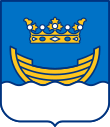Helsinki County Prison


The Helsinki County Prison ("Helsingin lääninvankila" in Finnish) in the Helsinki city quarters of Katajanokka was a prison that operated from 1837 to 2002. It was established in 1837 by Tsar Nikolai I[1] by the side of the Helsinki Crown Prison, which had operated from 1749. When completed, the prison had 12 cells, two rooms for guards and a worship room[2] which is still extant and has been used for church weddings. The prison area was surrounded by a high red brick wall. The prison was extended in 1888 with the construction of a cell block in the form of a cross, in the classical Philadelphia model;[3] the old part of the prison was converted to an administrative building.
The prison continued functioning after Finnish independence. During the Second World War, the prison was directly hit by an air strike on 6 February 1944. One guard was killed, a fire started and five prisoners used the opportunity to escape.
At the end of the war, some well known convicts from the War-responsibility trials in Finland were kept in the prison, including President Risto Ryti,[4] Prime Minister Väinö Tanner,.[5][6] The Estonian-born writer Hella Wuolijoki.[7][8][9] was there for high treason during World War II. Another inmate of note was Martta Koskinen, a seamstress and communist spy convicted of high treason who was executed by a firing squad on September 29, 1943. She was the last woman executed in Finland.
During its last years, Helsinki County Prison functioned as a remand prison, where arrested suspects were kept while awaiting trial. To reflect this, in 2001 the prison was renamed Helsinki Remand Prison. Some of the prisoners were also criminals that had failed to pay fines to which they had been sentenced. In 2002, prison operations ceased completely with the completion of the new Vantaa prison.
The building was renovated within the constraints of being a protected landmark and was re-opened in 2007 as a hotel.[10][11]
References[]
- ^ Katajanokka, Hotel. "The history of the building". Archived from the original on 2013-12-08. Retrieved 2014-03-21.
- ^ "Nokan majoitustoiminnalla on pitkät perinteet" (in Finnish). Best Western Premier Hotel Katajanokka. Retrieved 24 July 2009.
- ^ "Katajanokan vankila toimi 165 vuotta: Tällaista oli vankien elämä" (in Finnish). studio55.fi. Retrieved 2 December 2014.
- ^ Turtola, Martti. "Ryti, Risto (1889 - 1956), President of Finland". 100 Faces from Finland. Biografiakeskus / The national biography of Finland. Retrieved 2 April 2014.
- ^ Anon. (6 December 1948). "FINLAND: Political Paavo". TIME. Retrieved 2 April 2014.
- ^ Paavolainen, Jaakko. "Tanner, Väinö (1881 - 1966), prime minister, party leader, economist". 100 Faces from Finland. Biografiakeskus / The national biography of Finland. Retrieved 2 April 2014.
- ^ Anon. "Introduction: Hella Wuolijoki". Finnishplays.com. Finnish Playwrights and Screenwriters Guild. Retrieved 2 April 2014.
- ^ Katajanokka, Hotel. "Prisoners of note". Archived from the original on 2014-05-10. Retrieved 2014-03-21.
- ^ Manninen, Antti (8 November 2010). "Katajanokka Prison housed cross-section of Finnish inmates". Helsingin sanomat, English edition. Retrieved 2 April 2014.
- ^ Katajanokka, Hotel. "Years of note". Archived from the original on 2014-05-10. Retrieved 2014-03-21.
- ^ Appleby, Toni (23 August 2007). "Hotel Katajanokka, Helsinki". Guardian. Retrieved 2 April 2014.
Coordinates: 60°9′59.93″N 24°58′9.76″E / 60.1666472°N 24.9693778°E
- Hotels in Helsinki
- Prisons in Finland
- Katajanokka

